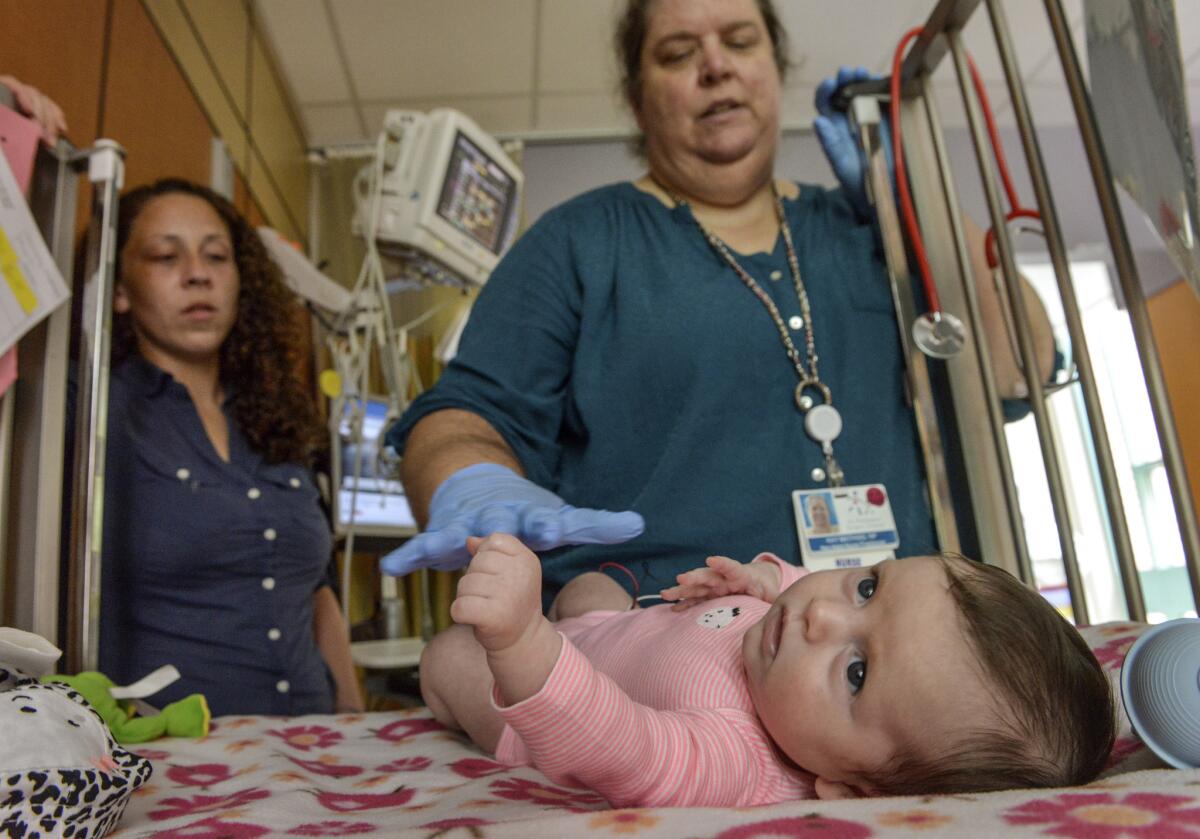Editorial: Tennessee’s effort to protect babies from mothers’ drug use creates new problems

Mount Washington Pediatric Hospital in North Baltimore has a department that specializes in weaning newborns off of heroin and methadone.
- Share via
As the abuse of opioids, including prescription painkillers and heroin, has risen in Tennessee, the number of babies born dependent on drugs has skyrocketed, increasing fifteenfold during the last 10 years. In an effort to combat this troubling trend, the state approved a controversial new law in 2014 to allow women who give birth to babies “harmed by” illegal drug usage to be charged with misdemeanor assault.
Under the law, “harm” can mean various things, but the impetus for it was the number of babies being diagnosed with neonatal abstinence syndrome — a painful but treatable condition whose long-term effects have yet to be determined. Other states have found ways to prosecute pregnant women for harming their newborns through drug use, but Tennessee is the first state to pass a specific law allowing women to be charged with a crime if their children are born drug-dependent.
Tennessee is the first state to pass a specific law allowing women to be charged with a crime if their children are born drug-dependent.
Legislators saw the law as a way to push women into getting treatment. But that’s not what is happening, say critics, including the American Civil Liberties Union of Tennessee and the Tennessee Assn. for Alcohol, Drug and other Addiction Services. They say the law has had the perverse effect of making pregnant women afraid to get prenatal care, lest they be arrested down the road. Some have avoided Tennessee hospitals altogether, leaving the state or even, in some cases, giving birth in cars.
The evidence may be anecdotal, but it’s plentiful. Jessica Young, a physician who runs the Obstetrics Drug Dependency Clinic at Vanderbilt University, says patients regularly tell her that they have tried to detox on their own (not medically advised for pregnant users) and have avoided seeing a doctor for prenatal care for fear of having their addiction revealed. Some only relented and showed up at her clinic late in their pregnancies — or when they were in labor. Or some women come to Young for treatment through their pregnancies and then deliver elsewhere in what Young suspects is an attempt to avoid being identified as a drug abuser.
As of early this year, 30 women had been arrested under the law. Only one spent time in jail. Many of the others went through drug treatment.
The American Medical Assn. is on the record opposing the criminalization of maternal drug addiction. And the American College of Obstetricians and Gynecologists issued an opinion in 2011 stating that jail or the threat of jail was “ineffective” in reducing alcohol and drug abuse.
And not every drug-using pregnant woman is a law breaker. Some are taking painkillers or antidepressants under a doctor’s care. Others are in recovery programs taking methadone or buprenorphine. But taking any of these drugs regularly, whether legally or illegally, gives the baby a 50% chance of being diagnosed with neonatal abstinence syndrome. Under the Tennessee law, a mother can defend herself by saying she was legally taking the drugs, but she might be charged first and then have to go to court to exonerate herself. That seems not only unfair, but needlessly costly for the defendants, courts and taxpayers. Of 895 reported cases of neonatal abstinence syndrome reported this year in Tennessee, about half the mothers were only using drugs that had been prescribed for them.
But here is the biggest problem with this law: There’s not enough space in Tennessee’s drug treatment programs to accommodate all the women currently seeking treatment. Of the 39 licensed residential detox facilities in Tennessee, only 11 take pregnant women. What’s more, methadone programs do not accept Tennessee’s version of Medicaid. Treatment with buprenorphine — another drug used to wean people off narcotics — is covered by Medicaid, but there are not enough doctors certified to prescribe it to meet the current need.
When the law was passed last year, legislators set it to expire in July 2016 so they could reevaluate it. That was wise. In their upcoming legislative session, they should let the law sunset and concentrate on expanding the availability of treatment rather than on locking up addicts with children. The best way for Tennessee and other states to get pregnant addicts into treatment is to make it easier for them to find it, not to incarcerate them if they don’t.
Follow the Opinion section on Twitter@latimesopinion and Facebook
More to Read
A cure for the common opinion
Get thought-provoking perspectives with our weekly newsletter.
You may occasionally receive promotional content from the Los Angeles Times.









